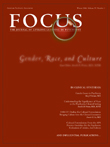From the Guest Editor
For most people, eating, sleep, and sex are among the most enjoyable activities of life. However, for many, some of these functions present problems, taking away from the overall quality of life. For some, one or more of these activities may become a source of unrelenting torment and despair. This issue of FOCUS brings together some of the best current thinking on an array of disorders affecting eating, sleep, and sex that are likely to be of considerable importance to the practicing psychiatrist. To start with, I assembled the same cast that constitutes the work group responsible for drafting APA’s forthcoming third revision of the Practice Guideline for the Treatment of Patients With Eating Disorders as well as the recent Guideline Watch updating the second edition. They assisted me in preparing a clinical synthesis article that summarizes the state of the art in the treatment of anorexia nervosa, bulimia nervosa, binge-eating disorder, and related problems. This presentation anticipates some of the new thinking that will appear in the next revision of the guideline.
An article by McIntyre and Konarski reviews common questions and dilemmas that clinicians encounter on a daily basis in connection with overweight and obesity among psychiatric patients—as a component of patients’ disorders and as a side effect of medication. Among other things, the authors discuss the metabolic syndrome and medical and behavioral interventions for patients struggling with weight gain.
Disorders of sexual function are common but are underdiagnosed and inadequately addressed in many psychiatric practices. Levine, who has written authoritatively about sexual difficulties in medical practice for several decades, “reintroduces” clinical sexuality with a number of well-tried, effective, and wise perspectives that clinicians should keep in mind as they think through sexual issues in their patients. IsHak and his colleagues review the broad area of sexual dysfunction and provide an up-to-date presentation of medical and psychosocial approaches to treatment. Finally, the Ask the Expert column and the Patient Management Exercise focus on gender and gender identity issues.
In addition to these original contributions, several notable articles are reprinted from other sources. A bibliography is included that will allow readers to pursue this issue’s topics in greater depth.
The wealth of information and insights provided in this collection will help clinicians reduce the suffering that patients and their families endure as a result of eating, sleep, and sexual disorders and help them increase their patients’ capacities to enjoy and derive pleasure from these elemental human activities.



